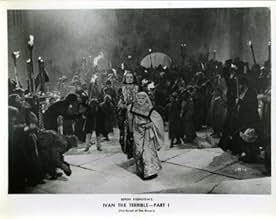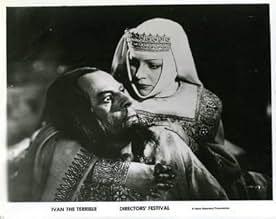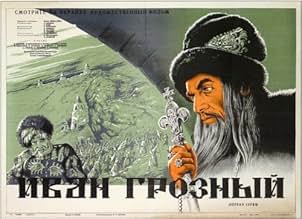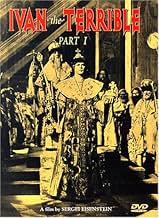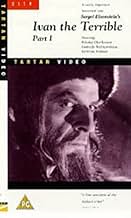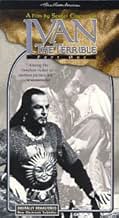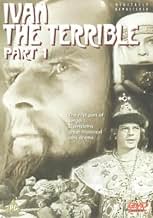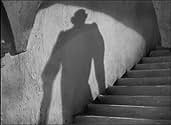IMDb RATING
7.7/10
11K
YOUR RATING
During the early part of his reign, Ivan the Terrible faces betrayal from the aristocracy and even his closest friends as he seeks to unite the Russian people.During the early part of his reign, Ivan the Terrible faces betrayal from the aristocracy and even his closest friends as he seeks to unite the Russian people.During the early part of his reign, Ivan the Terrible faces betrayal from the aristocracy and even his closest friends as he seeks to unite the Russian people.
- Director
- Writer
- Stars
- Awards
- 2 wins & 1 nomination total
Aleksandr Rumnev
- The Stranger
- (as Aleksandr Rumnyov)
- Director
- Writer
- All cast & crew
- Production, box office & more at IMDbPro
Featured reviews
This first part of Eisenstein's filming of the life and times of "Ivan the Terrible" has lots of drama, very good characterizations, fascinating settings, and plenty of action. Nikolai Cherkasov is completely convincing in the lead role, and the rest of the cast complements him well (especially Serafima Birman as his crafty aunt). This period in history is quite interesting and significant in itself, and Eisenstein presents everything in a fashion that is thoughtful and also enjoyable to watch.
Ivan combined a remorseless personal ambition with a genuine desire to strengthen and protect Russia, while the boyars, who opposed him, acted from motives that were almost exclusively personal. Combined with the plans of Russia's neighbors, all of this makes for a complex and interesting series of events, and the movie does a good job of presenting both the events and the possibilities, both on the surface and behind the scenes. Not the least of the reasons why it works so well are the settings. They are always interesting, believable, and atmospheric - and the indoor settings are especially so.
Part One is praiseworthy both in its own right and as the foundation for the outstanding sequel. Eisenstein generally excelled at depicting important periods in his country's history, and his series on Ivan's critical reign demonstrates all of his many skills. His attention to detail (of which there are too many examples even to try to list) and his appreciation for the overall picture make this a memorable film of high quality.
Ivan combined a remorseless personal ambition with a genuine desire to strengthen and protect Russia, while the boyars, who opposed him, acted from motives that were almost exclusively personal. Combined with the plans of Russia's neighbors, all of this makes for a complex and interesting series of events, and the movie does a good job of presenting both the events and the possibilities, both on the surface and behind the scenes. Not the least of the reasons why it works so well are the settings. They are always interesting, believable, and atmospheric - and the indoor settings are especially so.
Part One is praiseworthy both in its own right and as the foundation for the outstanding sequel. Eisenstein generally excelled at depicting important periods in his country's history, and his series on Ivan's critical reign demonstrates all of his many skills. His attention to detail (of which there are too many examples even to try to list) and his appreciation for the overall picture make this a memorable film of high quality.
Eisenstein's 'Ivan the Terrible' once featured in an American book of the 50 worst films of all times, along with 'Attack of the Killer Tomatoes' and 'Plan 9 from Outer Space'.
But as true cinemaniacs acknowledge, 'Ivan', along with 'Ivan the Terrible Part 2', is one of the great masterpieces of the screen. Its style is highly artificial, the acting operatic with no condescension to realism. But the viewer is swept away by the stylised pacing, the way each scene is so precisely plotted and designed -- each camera shot becomes a precious ornamented jewel. The film is, like the earlier 'Alexander Nevsky', as much a vehicle for the great Russian composer Prokofiev as for Eisenstein -- the two attained a cinematic union of image and music which has been rarely equaled since.
The two 'Image' Region 1 DVDs for Ivan Parts One and Two are spartan affairs, with no added features. The orchestral soundtrack is definitely low-fi. But the print sources must have been excellent -- the black-and-white prints are as lustrous as the finest modern movie, the images sharp and clear. And when the film suddenly switches from black-and-white and erupts in colour, the colour is dense and brilliant, unlike the bleached and pale versions usually doing the art-cinema rounds.
How fantastic to have available such treasures on DVD, in such pristine condition! Buy! Buy! Buy!
But as true cinemaniacs acknowledge, 'Ivan', along with 'Ivan the Terrible Part 2', is one of the great masterpieces of the screen. Its style is highly artificial, the acting operatic with no condescension to realism. But the viewer is swept away by the stylised pacing, the way each scene is so precisely plotted and designed -- each camera shot becomes a precious ornamented jewel. The film is, like the earlier 'Alexander Nevsky', as much a vehicle for the great Russian composer Prokofiev as for Eisenstein -- the two attained a cinematic union of image and music which has been rarely equaled since.
The two 'Image' Region 1 DVDs for Ivan Parts One and Two are spartan affairs, with no added features. The orchestral soundtrack is definitely low-fi. But the print sources must have been excellent -- the black-and-white prints are as lustrous as the finest modern movie, the images sharp and clear. And when the film suddenly switches from black-and-white and erupts in colour, the colour is dense and brilliant, unlike the bleached and pale versions usually doing the art-cinema rounds.
How fantastic to have available such treasures on DVD, in such pristine condition! Buy! Buy! Buy!
On a backdrop of intrigue, murder and betrayal, Prince Ivan conquers enemies and becomes the first Czar of all Russia, at the cost of his own soul.
Eisenstein's name and reputation loom over film history in such a forbidding way that you would be forgiven for deeming his work impenetrable by modern standards, yet while his silent epics are so seminal as to be hard to evaluate objectively, his late talking films can be hugely rewarding viewing, even to more casual film-goers. As a summation of his artistic evolution and scholarship, they are no less treasurable or significant than Battleship Potemkin, yet they have a more compelling story to tell.
Ivan The Terrible was to be a trilogy, of which only parts 1 and 2 were completed before their creator fell into disfavor with Stalin. Yet parts 1 and 2 are rich enough that together they form a perfect story ending on a chilling note. On to part 1 then...
Part 1 tells the story of Prince Ivan from young hopeful to warlord and recluse, before he truly accepts his calling. It is an incredibly romanticized tale, and formally, a relic of a time long gone, one that perhaps only ever existed in Eisenstein's mind. His was a unique visual sensibility and the Ivan films are full of layered, meticulously composed and designed shots: characters scurry like rodents through claustrophobic tunnels, the look is at times so expressionistic as to evoke where The Cabinet of Dr Caligari might have evolved. It is both familiar and horribly alien, like the nightmare it later confirms itself as in part 2.
Given the conflicting emotions evoked - heroism with oppression, epic scale but suffocating formalism - you would do well to brace yourself through this one and remember that only once you've seen both parts will it all make terrible sense. Only then will you appreciate the unique genius at work here.
One cannot distinguish between the two Ivans for one cannot exist without the other, and together, they form one of the best films ever made.
Eisenstein's name and reputation loom over film history in such a forbidding way that you would be forgiven for deeming his work impenetrable by modern standards, yet while his silent epics are so seminal as to be hard to evaluate objectively, his late talking films can be hugely rewarding viewing, even to more casual film-goers. As a summation of his artistic evolution and scholarship, they are no less treasurable or significant than Battleship Potemkin, yet they have a more compelling story to tell.
Ivan The Terrible was to be a trilogy, of which only parts 1 and 2 were completed before their creator fell into disfavor with Stalin. Yet parts 1 and 2 are rich enough that together they form a perfect story ending on a chilling note. On to part 1 then...
Part 1 tells the story of Prince Ivan from young hopeful to warlord and recluse, before he truly accepts his calling. It is an incredibly romanticized tale, and formally, a relic of a time long gone, one that perhaps only ever existed in Eisenstein's mind. His was a unique visual sensibility and the Ivan films are full of layered, meticulously composed and designed shots: characters scurry like rodents through claustrophobic tunnels, the look is at times so expressionistic as to evoke where The Cabinet of Dr Caligari might have evolved. It is both familiar and horribly alien, like the nightmare it later confirms itself as in part 2.
Given the conflicting emotions evoked - heroism with oppression, epic scale but suffocating formalism - you would do well to brace yourself through this one and remember that only once you've seen both parts will it all make terrible sense. Only then will you appreciate the unique genius at work here.
One cannot distinguish between the two Ivans for one cannot exist without the other, and together, they form one of the best films ever made.
I have two comments to make about some disparaging remarks made by other contributors: First, it is naive to condemn this film as "propaganda" -- GONE WITH THE WIND is all propaganda about how great the Old South was and how great the Ku Klux Klan was. LAWRENCE OF ARABIA is propaganda about how heroic and clever the English were and how corrupt the Turks were. DR STRANGELOVE is all propaganda, too. THE ALAMO and other John Wayne films are propaganda about how great the conquest of the West was, how heroic the ethnic cleansing against the Indians was, and how corrupt the Mexicans were. So spare me your hypocritical condemnation of this film as "Stalinist Propaganda".
Secondly, what definitions can there be for whether a film is "great" or not? I suggest the use of two criteria: (A) Is viewing the film multiple times worthwhile and interesting? (B) Does viewing the film represent a memorable life experience? With these criteria, it does not matter whether the film is "dated" or the acting is "overdone" or whether the sound is flawed or in this or that quality. I certainly find IVAN THE TERRIBLE more interesting the more times I view it. On the other hand, there are movies that I consider "great" even though I refuse to watch them ever again, because I found them unbearably sad -- recent examples are SCHINDLER'S LIST and MILLION DOLLAR BABY.
Secondly, what definitions can there be for whether a film is "great" or not? I suggest the use of two criteria: (A) Is viewing the film multiple times worthwhile and interesting? (B) Does viewing the film represent a memorable life experience? With these criteria, it does not matter whether the film is "dated" or the acting is "overdone" or whether the sound is flawed or in this or that quality. I certainly find IVAN THE TERRIBLE more interesting the more times I view it. On the other hand, there are movies that I consider "great" even though I refuse to watch them ever again, because I found them unbearably sad -- recent examples are SCHINDLER'S LIST and MILLION DOLLAR BABY.
If Alexander Nevsky was a filmed opera, this one, the first part of Eisenstein's incomplete trilogy about the title character, looks more like a Stalinist version of a Shakespere play, with a lot of conspiracy and characters so desirous for power that are willing to do whatever it takes, but manichaeist and with almost undisguised propaganda of the infamous Russian dictator. Exactly for being theatrical, it is too formal, but it is so intense that it is impossible to be indifferent, the visual composition is extraordinary, using very well the light-and-shade game typical of the German Expressionism, the alternation between very open shots and close ups, and very rich costumes and set decoration. In the end, although it is not perfect, is a remarkable film that deserves all the praise it received.
Did you know
- TriviaTook over 3 years to make.
- GoofsAfter Anastasia's death, when discussing the Livonian war the "only" son of the Czar is mentioned. However at the time Ivan had two sons, Feodor, who became Czar Feodor I of Russia, and also Tsarevich Ivan Ivanovich.
- Quotes
Czar Ivan IV: Those who tore down the bells without Czar's permission, those by Czar's command get torn down the heads for not too long.
- Crazy creditsAll the credits are showed in front of a fire smoke.
- ConnectionsEdited into Histoire(s) du cinéma: Une histoire seule (1989)
Details
Box office
- Gross worldwide
- $12,196
- Runtime1 hour 43 minutes
- Color
- Sound mix
- Aspect ratio
- 1.37 : 1
Contribute to this page
Suggest an edit or add missing content



